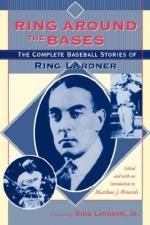|
This section contains 3,300 words (approx. 11 pages at 300 words per page) |

|
SOURCE: "Ring Lardner: Not an Escape, but a Reflection," in The Twenties: Fiction, Poetry, Drama, edited by Warren French, Everett/Edwards, 1975, pp. 101-10.
In the following essay, Spatz surveys Lardner's short fiction, placing the major stories in the literary tradition of despair that had begun in the early 1920s with T. S. Eliot's "The Waste Land."
The twenties were an age of humor. The list of names—Mencken, Benchley, Thurber, Parker, Lewis, and Lardner, to mention a few—is impressive. And there was plenty to laugh about. The war to end all wars had ended. Prosperity was in the air, and with it arrived what we have come to recognize as a particularly modern brand of hedonism, compounded of potent drugs, constant movement, and uninhibited sexual expression. What gave the twenties their special character (achieved again in the sixties) was this feeling of having been freed from traditional...
|
This section contains 3,300 words (approx. 11 pages at 300 words per page) |

|


